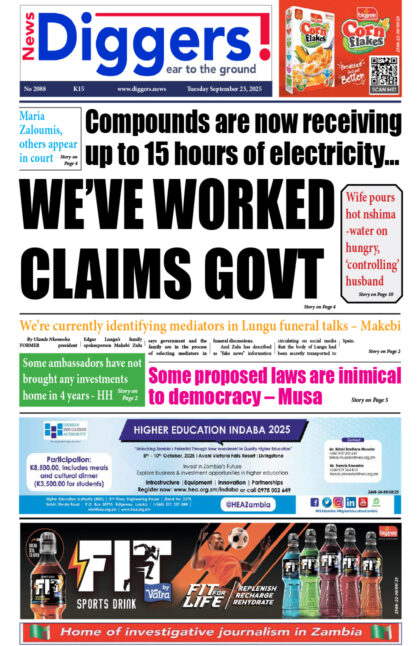THE Electoral Commission of Zambia (ECZ) says, as an institution, it is not in the business of rigging elections and will protect the August 12 vote from possible manipulation. The Commission further adds that it has in the past shared the result management framework to the political parties and other stakeholders for them to understand and appreciate the processes involved. Further, the Commission wonders how someone could rig elections where even the parallel voter tabulation was allowed.
It is our considered view that the word rigging could mean so many things, depending on who is speaking. If we are looking at it from the definition of “managing a given process fraudulently so as to gain an advantage”, we can say that it is wrong for the Commission to say that rigging does not happen. But if ECZ understands rigging as a process where they have to discard votes for a willing candidate and increase those for a losing competitor, then we understand why they can confidently say that they are not in that business.
But no one expects ECZ to sanction or embark on a rigging process of that nature for or against the party in power. It is true in that respect that it is not their job to rig elections, but they have to understand that there are people whose job is to do exactly that; to manipulate the system, to intimidate ECZ and to make sure that they break the laws. Those people don’t need offices inside the Elections House. They have to operate from a distance.
The problem is transferred to ECZ if they tolerate those attempts. That is when they become accomplices to rigging. If ECZ is incapable of running their affairs correctly, if they are incapable of punishing culprits, if they cannot suspend or expel erring candidates or political parties that take part in electoral malpractice, that is aiding rigging and that is what is of concern to the Zambian citizenry.
Let’s take the situation in Malawi for example: We published a story which attested to the fact that a lot of Malawians registered as voters in Zambia. Now, that was a solid story not only because someone spent time on the border investigating, but because the evidence was overwhelming. Foreigners are on camera confirming that ‘yes we are Malawians, yes we have been given NRCs and voter’s cards, and yes we have been told to vote for the party in government. Those are facts, and the evidence is there for all to see. News Diggers! did not cook that evidence. So the question is, who is to blame?
People who went across the border to recruit those Malawians did so in an attempt to rig our elections, has ECZ been able to intervene in that? Have they at least taken interest to independently investigate the matter so that they can establish the facts? What are they doing about it?
Understandably, ECZ does not issue NRCs. It is the the Ministry of Home Affairs which does so, but what do they have to say for themselves in light of the evidence we published? Do they think the people who brought in foreigners to vote want free and fair elections?
Mr Patrick Nshidano can say that his commission does not rig elections, that they cannot issue voter’s cards to foreigners but they did so, not because they intended to rig, but because they were beaten by people attempting to manipulate the outcome of the elections. People who work for the ruling party went into Malawi, recruited and registered foreigners then came ECZ, thinking that everyone with an NRCs is a Zambian when in fact not. They were dribbled! That is rigging!
It is clear that our Commission does not have the necessary tools and authority they may need to prevent rigging, but it is our measured opinion that they have not done enough with the power they have.
Let’s talk about biased coverage on state media. Is that not rigging? We are disappointed that less than a month to the general elections, ECZ continues to allow public media’s bias in favour of PF. The commission continues to allow President Edgar Lungu’s campaign activities under a supposed ban in Lusaka. Most of all, we are disappointed that The Commission criticises stakeholders for talking about rigging when elections are clearly being manipulated.
Isn’t it rigging when national television continuously promotes the views of the ruling party while only covering negative news of the opposition? Isn’t it rigging when opposition political parties need a police permit to conduct their campaign activities while PF officials use their positions to side step the law for the same purpose?
The leadership at the Commission needs to be firm and decisive when dealing with these political parties. The current toothless nature of the Commission has been perfect for individuals who have, once more, successful rigged our general elections.
























